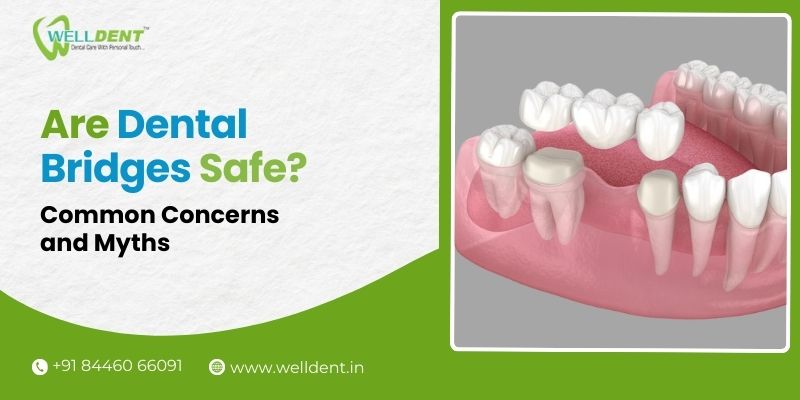Are Dental Bridges Safe? Common Concerns and Myths

Dental bridges are more than just a dental approach; they’re a lifeline for those struggling with weakened or missing teeth! For a long time, these strong fixtures have been like trusty heroes for your smile, filling in the gaps from missing teeth and bringing back both function and looks to your smile.
However, despite their well-earned reputation, a cloud of myths and misconceptions still lingers, causing some people to hesitate. Are dental bridges really as safe and reliable as they appear? Let's dive into the world of dental bridges, debunk the myths, and uncover the truth about how these solutions can not only enhance your smile but also boost your confidence!
What Exactly is a Dental Bridge?
In simple terms, a dental bridge is like a replacement tooth that 'bridges' the gap where one or more teeth are missing. It’s made up of crowns that sit on the neighboring healthy teeth, with a false tooth (pontic) in the middle. It not only improves your smile but also restores the function of your teeth.
Are Dental Bridges Safe?
Absolutely! Dental bridges are incredibly safe and widely recommended by dentists. They’ve been around for years and have a proven track record. However, like any dental treatment, the success of the procedure depends on factors like the skill of the dentist and the materials used. With modern advancements, dental bridges are more comfortable and precise than ever.
Common Concerns About Dental Bridges
- Will the Dental Bridge Affect My Natural Teeth?
It’s natural to wonder if the procedure could harm surrounding teeth. Rest assured, when done by a skilled dentist, the process is very safe. The adjacent teeth are only minimally altered. - Are Dental Bridges Uncomfortable?
Many people fear that their dental bridge might feel awkward or unnatural, but that’s a myth. With today’s technology, bridges are crafted to fit perfectly and feel just like your natural teeth. Any initial discomfort usually fades after a short adjustment period. - How Long Do They Last?
Dental bridges can last several years with proper care, making them a long-term solution for missing teeth. Regular dental checkups and good oral hygiene will help ensure that your bridge stays in great shape.
Myths About Dental Bridges
There are some myths that could make you second-guess getting a dental bridge. Let’s bust a few:
- Dental Bridges Are Only for Older Adults
While seniors commonly use dental bridges, people of all ages can benefit from them, especially if they’ve lost a tooth due to injury or decay. - Dental Bridges Require Extensive Tooth Removal
It’s true that dental bridges involve the preparation of surrounding teeth, but modern techniques are much more conservative. Some types, like the Maryland bridge, even require minimal tooth alteration! - Dental Bridges Are Too Expensive
While the cost might seem high initially, dental bridges are an investment in your smile and overall health. Given their longevity, they often prove to be a cost-effective solution in the long run. - Dental Bridges Cause Bad Breath or Gum Problems
Not if you maintain proper oral hygiene! As long as you brush, floss, and visit your dentist regularly, there’s no reason why your bridge would cause bad breath or gum issues.
Types of Dental Bridges
Choosing the right bridge depends on your needs. Common options include:
- Maryland Bridges: Minimal tooth alteration, ideal for front teeth.
- Cantilever Bridges: Used when there’s only one adjacent tooth to anchor the bridge.
Dental bridges are a great way to regain both function and beauty in your smile. They’re safe, effective, and can last for several years when properly maintained. Don't let myths or concerns hold you back! They're one of the safest, most reliable ways to restore your smile.
If you’re still unsure or want to learn more about dental bridges, book an appointment with our expert at WellDent Family Dental Care. We will help you figure out the best option for your specific needs.




